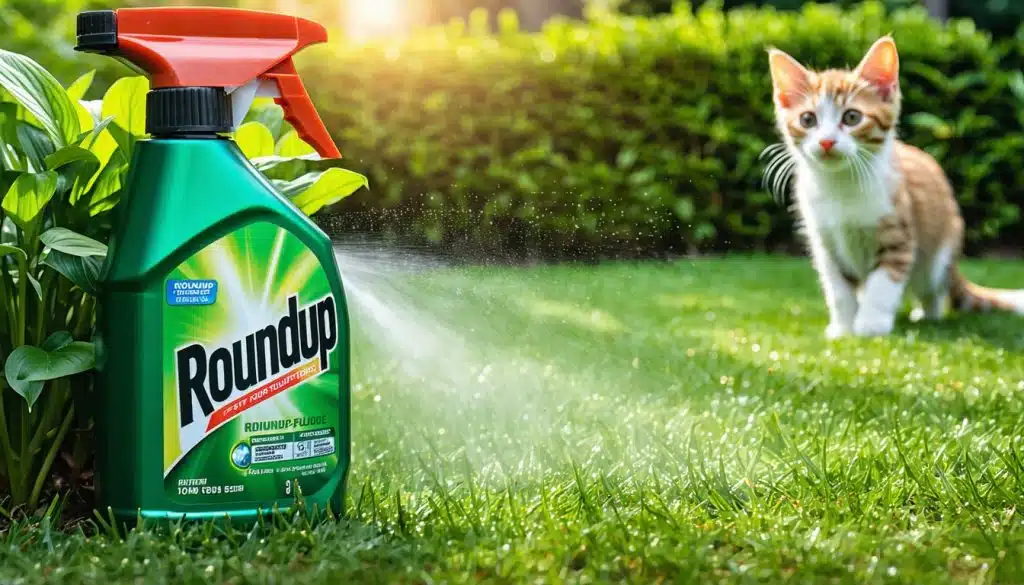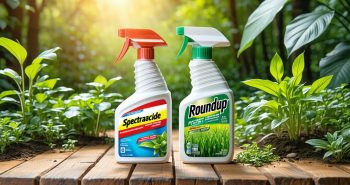How Long After Spraying Roundup Is It Safe for Pets to Go Outside?

So you’ve got a garden looking like a jungle, and you’ve decided Roundup might be the magic potion to tackle the wilderness outside. But suddenly, it hits you—what about the fur babies? Nobody wants their pets playing Sherlock Holmes on a fresh carpet of chemicals. Let’s chat about when it’s cool to let your four-legged pals roam free in the yard again after spraying Roundup.
We’ll figure out the who, what, when, and why of Roundup’s impact on your furry friends. Trust me, it’s not all doom and gloom—there are smart ways to keep your fur babies safe while getting rid of those pesky weeds without sacrificing a pretty garden.
I’m here to spill the beans on timing, tips, and some handy dandy safe alternatives that play nice with the critters. Keep reading, and soon you’ll be the pro at making choices that keep tails wagging and your mind at ease. Let’s dive into pet safety around Roundup—you’re gonna want to sit up and pay attention; your pet’s safety counts on it!
Table of Contents:
Why Pets Should Be Kept Away After Spraying
Keeping your pets safe when sprucing up your garden with weedkillers can be a tangled affair, especially if you’re using Roundup. This product packs glyphosate, a tricky chemical, which can cause chaos if your pets come sniffing around right after you’ve sprayed.
The Scary Side of Glyphosate
Ever thought about what’s in Roundup? It’s the dose of glyphosate, and animals, including our furry friends, aren’t so friendly with it. If your pets go prancing about where the spray’s fresh, they might get the stuff on their fur or feet. And guess what? When they clean themselves, they’re likely to swallow that nasty residue. Not ideal, right?
Health Alerts for Our Pets
When it comes to glyphosate, pets can suffer a range of troubles, even if they don’t show it right away. You might notice tummy troubles, itchy skin, or even some wheezing. If things get real bad, it could mess with their organs too. So if your pet plays around on treated surfaces and then starts acting strange, you should definitely give your veterinarian a buzz.
Sit Tight Before Letting Pets Loose
To play it safe, don’t rush the pets back into Roundup zones. Give it some time to dry and let the residue break down. Each Roundup product may have different safety wait times, so better check that tiny print on the label. It’ll keep you in the know about how long you should keep Fluffy away.
Just a Heads Up
Once the waiting game’s over, don’t just fling open the backyard gate without a care. Dirt, plants, or grass soaked up with glyphosate can still be troublemakers. Maybe set up a specific pet-friendly corner where they can frolic without worry. Watch them like a hawk till you’re sure everything’s right as rain.
Keeping a look out for dangers like glyphosate while you follow safety tips helps guard your pets from health hiccups caused by Roundup. If things go south and your pet seems under the weather after being around treated places, get to the vet pronto. Keeping your precious pets safe from harmful chemicals is just as important as having that perfect lawn!
Recommended Waiting Times for Safety
So, you’ve sprayed your yard with some weed killer and now you’re eyeing your pet, wondering when it’s okay for them to romp through the treated area without picking up any nasty chemicals. Here’s the skinny on how long you should wait before letting Fluffy or Fido roam free.
Different areas need different waiting times, and here’s the scoop on the usual recommendations:
| Treated Area | Chill Time Recommended |
|---|---|
| Lawn | 24 hours |
| Garden Beds | 24 hours |
| Driveways/Sidewalks | 48 hours |
| Play Areas | 72 hours |
These waiting periods are your friend. They lessen your pet’s chance of hopping onto wet grass or driveways and accidentally soaking up unwanted chemicals. But remember, Mother Nature has her say too. Things like rain or high winds—and even what product you’re using—can change how effective or lingering the chemicals might be.
Curious about why you should keep your four-legged buddy away from freshly sprayed spots? Check out our detailed dish on the risks of glyphosate exposure in the article about how much exposure to Roundup is dangerous.
Being a pet parent means juggling a lot—but keeping your little sidekick safe is worth it. If you’re feeling iffy about Roundup or the like, your vet is just a call away, ready to offer advice tailored just for your furry buddy’s well-being.
What If Pets Walk on Treated Areas
Ever caught your furry buddy wandering through a patch of just-sprayed yard? It’s a real headache, worrying about their health when they tromp through areas treated with weed killer like Roundup. But chill out, let’s dive into what to do if your pet finds themselves strutting over those freshly-treated spaces.
Risks of Pets Walking on Sprayed Places
When your pet makes an unscheduled pit stop on a plot that’s just seen a spritz of Roundup, it’s not all sunshine and rainbows. Their paws might soak up the herbicide, which sounds as gross as it is dangerous. You’ve got skin rashes, tummy troubles from licking their toes, or even nastier issues if they somehow wolf down a lot of that stuff.
Immediate Steps to Take
Don’t freak out if your little explorer has gone wading through the ‘no-go’ zone. Snap into action with these steps to cut down their exposure:
- Get ‘Em Outta There: Snatch ’em up and carry them away from the treated area as quick as you can to stop them from becoming a Roundup sponge.
- Wash Those Grubby Paws: Give those paws (and pretty much any skin or fur that might have brushed up against the herbicide) a solid scrub. Mild pet shampoo and warm water do the trick.Your aim? Wash away any chemical hitchhikers.
- Keep an Eye Out: Watch them like a hawk. If they start acting funny—barfing, looking worn-out, or turning red in the face—ring up your vet pronto.
Recommended Actions
If your pet’s gotten cozy with the treated ground, it’s always a smart move to chat up your vet. Fill them in on how and when the deed went down so they can help craft a game plan to keep your furball fighting fit.
Dodging Future Mishaps
Want to avoid repeat performances of the Roundup routine? Here’s your playbook:
- Block Off the Zone: Sling a ‘Do Not Disturb’ sign over treated spots until you know it’s all-clear for paws. Use whatever you’ve got to fence it off—you’re creating Fort Safety here.
- Time It Right: Save the herbicide heroics for when the pets are inside binge-watching TV, or at least when you can keep an eye on them.
- Stash It Properly: Lock up your weed-killer arsenal somewhere Fido or Fluffy can’t nosedive into it. No one wants an emergency vet trip because a bottle turned into a chew toy.
By taking a bit of time to set some boundaries and acting fast if your pet gets into mischief, you’ll help them steer clear of nasty surprises. For more insider info on using Roundup around pets without it turning into a safety fiasco, sniff around our article on is Roundup safe for pets.
Safer Weed Killer Alternatives for Pet Owners
If you’re on the hunt for a pet-safe way to tackle those pesky weeds in your garden, you’re in good company. Many pet owners are steering away from Roundup because of the potential risks it poses to our four-legged pals. Lucky for us, there are a bunch of other options that get the job done without putting our furry buddies in harm’s way.
| Weed Killer | What’s Inside | Why It’s Pet-Friendly |
|---|---|---|
| Vinegar Solution | Acetic acid | Gentle on pets and Mother Nature |
| Corn Gluten Meal | Corn-based protein | Blocks weeds naturally |
| Essential Oil Sprays | Natural oils (think clove, citrus) | Safe with a side of nice smells |
| Boiling Water | Just water | Pure and simple, yet powerful |
Vinegar Solution
Vinegar with a punch—high in acetic acid. It’s like an eco-friendly superhero fighting weeds while staying mellow around pets. But watch out! This stuff’s powerful, so aim carefully unless you want to zap your prized roses too.
Corn Gluten Meal
Ever heard of corn gluten meal? This stuff is as natural as it gets—a byproduct of corn processing. It’s brilliant at stopping weeds from sprouting, and it’s a bonus for the soil too. Your garden wins, your pets win, we all win.
Essential Oil Sprays
Dive into the world of essential oils. Clove and citrus oils are not just great for massages—they’re weed killers too. Non-toxic, they come with sweet scents that make your garden smell divine while staying friendly to pets and wildlife alike.
Boiling Water
Good old boiling water—a classic! Pour it over weeds and watch them shrivel up. There’s no need for more chemicals when nature’s got your back. It’s a simple solution that’s absolutely safe around those curious paws.
By picking these greener, pet-friendly weed killers, you’re keeping your outdoor space safe and sound. It’s like giving your garden a hug while keeping it tidy. Always match the right method to your garden’s needs and keep those pets happy and healthy.
File a Claim With the Roundup Lawsuit
If you’re dealing with health problems after using Roundup and think you might deserve some compensation, diving into the Roundup lawsuit pool might just be your ticket to getting what you deserve.
Understanding Roundup Lawsuits
These lawsuits are buzzing around because folks are claiming that glyphosate—the stuff that makes Roundup tick—might be tied to some heavy-hitting illnesses like non-Hodgkin lymphoma, leukemia, and cancer. If you reckon Roundup’s the culprit behind your health woes, you have every right to chase after the damages you believe you’ve suffered.
Eligibility Criteria
To jump into a Roundup lawsuit, you’ve got to show a tight link between your Roundup use and your health issues. Dig out those medical records, diagnosis slips, and any paper trails that’ll back up your case. A chat with a top-notch lawyer who knows product liability and personal injury like the back of their hand can help sort if you’re good to go and give your case that extra oomph.
Filing Process
Cranking up a lawsuit kicks off by slapping a legal complaint against the Roundup maker, pointing fingers at them for your health dilemmas. The lawsuit has its twists and turns: discovery, depositions, maybe a courtroom showdown. Stick close to your legal eagle to sail through the legal stuff without a hitch and make sure your rights are stitched up tight as the process unfolds.
Compensation and Settlements
Dollars for damages in Roundup cases can cover medical bills, paycheck gaps, your aches and pains, and even slap some punitive damages on the manufacturer. Settlements bounce all around depending on how intense the injuries are and other key bits and pieces. Attorneys who’ve wrangled with Roundup suits before can give you the lowdown on what kind of scratch you might pull in and steer you toward scoring a sweet deal.
Seeking Legal Assistance
Running the gauntlet of Roundup lawsuits means having a solid grip on product liability and personal injury claims. Latch onto a savvy attorney who specializes in Roundup action to champion your cause the right way. A rock-solid legal squad will give you tailored guidance, stand up for you, and chase down every last cent you’re rightfully due.
Jumping into the game by filing a Roundup lawsuit lets you put your foot down, call out those who’ve done you wrong, and square up for the financial hits from Roundup exposure. Feel like you’ve got a case against Roundup? Pitch it to a legal pro to check your legal playbook and chase the justice and pocket change you rightfully deserve.









